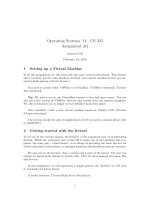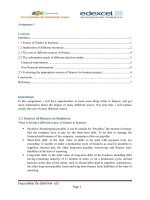5039 assignment 1 frontsheet
Bạn đang xem bản rút gọn của tài liệu. Xem và tải ngay bản đầy đủ của tài liệu tại đây (1.17 MB, 26 trang )
<span class="text_page_counter">Trang 1</span><div class="page_container" data-page="1">
<b> ASSIGNMENT 1 FRONT SHEET </b>
<b>Unit number and title Unit 6: Management a Successful Business Project (5039) </b>
<b>Student declaration </b>
I certify that the assignment submission is entirely my own work and I fully understand the consequences of plagiarism. I understand that making a false declaration is a form of malpractice.
<b>Student’s signature: Anh </b>
<b>Grading grid </b>
</div><span class="text_page_counter">Trang 2</span><div class="page_container" data-page="2">Summative Feedbacks: Resubmission Feedbacks:
<b>Internal Verifier’s Comments: </b>
<b>Signature & Date: </b>
</div><span class="text_page_counter">Trang 3</span><div class="page_container" data-page="3"><b>INTRODUCTION... 5 </b>
<b>BODY ... 5 </b>
<b>I. The project lifecycle: ... 5 </b>
<b>1. Definition: ... 5 </b>
<b>2. The stages of the project lifecycle (PLC): ... 5 </b>
<b>3. PLC’s importance to the success of a project. ... 6 </b>
<b>II. The factors to be considered when compiling a project management plan (PMP). ... 7 </b>
<b>1. Estimation of Projects ... 7 </b>
<b>2. Organizing Project Team’s ... 8 </b>
<b>3. Task Scheduling in Relation to a Project's Timeline ... 8 </b>
<b>4. Juggling and Balancing Project Priorities ... 9 </b>
<b>III. Examine a range of research methods and strategies and their importance to project </b>
</div><span class="text_page_counter">Trang 4</span><div class="page_container" data-page="4"><b>V. Produce a detailed work breakdown structure and a schedule to provide timeframes and stages VIII. Critically evaluate the project-management process, PMP and research methods for gathering information and data collection. ... 23 IX. Justify the choices made in the design of the PMP for completing the aims and objectives of the project. ... 25 CONCLUSION ... 25 REFERENCE ... 26 </b>
</div><span class="text_page_counter">Trang 5</span><div class="page_container" data-page="5"><b>INTRODUCTION </b>
As can be seen, the cosmetics industry is expanding, with hundreds of different brands available around the world. Customers in Vietnam are big fans of Korean beauty products. As a result, Innisfree has expanded into the Vietnamese market. Because the demand for beauty products is growing, brands must keep up with the latest trends while also developing products that are both safe and environmentally friendly. Innisfree is one of the few companies that can make this claim. As a result, I conducted research and launched a new product launch campaign for Innisfree.
<b>BODY </b>
<b>I. The project lifecycle: </b>
<b>1. Definition: </b>
The project management life cycle outlines the high-level processes involved in completing a project successfully. In most cases, the project management life cycle is divided into four phases: initiation, planning, execution, and closure. These phases make up the path that leads from the start to the finish of
</div><span class="text_page_counter">Trang 6</span><div class="page_container" data-page="6"><small>Start Date End Date </small>
<b>3. PLC’s importance to the success of a project. </b>
The project life cycle is critical to ensuring that a high-quality project is delivered on time, on budget, and with minimal risk. The project life cycle aids in project management, which is critical for achieving successful results. The following points highlight the significance of the project life cycle:
<b>Create a Project Plan </b>
A better project structure allows for better monitoring and results. A project life cycle can be used to divide a project into stages, making the structure easier to understand and track.
Employees know which task to complete, and management knows when to expect a sub-task of the project to be completed, which improves the project's overall efficiency (Townes, 2020).
<b>Improved Communication </b>
The project life cycle aids better communication between employees and management by better structuring and planning a project. Employees are aware of which tasks must be completed on which dates and when they must be completed.
Similarly, management understands when and what to expect from each employee, as well as when to motivate them to improve their work, resulting in improved communication and results between employees and management (Townes, 2020).
<b>Aids in Progress Monitoring </b>
In terms of tracking progress, the project lifecycle is the most important. The project life cycle helps evaluate how competitive project work has been going with planning and where the pace is required, or cost-cutting is necessary, thanks to task divisions and prior finalization of schedule and cost. Tracking aids in the completion of a project according to plan, ensuring that the project is completed on time and within budget. Projects used to exceed their budgeted costs, and project risks were not identified before the project life cycle. Following the project life cycle, projects are not only completed on time, but also within budget and resources, resulting in cost and resource savings for the project's authority (Townes, 2020).
</div><span class="text_page_counter">Trang 7</span><div class="page_container" data-page="7"><b>Assists in the betterment of project management </b>
In terms of project management, the project life cycle is critical. It aids in the management of project time, cost, resources, and employee efforts. The project life cycle helps strategize each sub-task at a low cost by identifying and planning each aspect of the project at the outset.
Employees predetermined their tasks, and when they completed them by a predetermined deadline, the cost and resources were indirectly managed appropriately (Townes, 2020).
<b>Aids in the cost-cutting process </b>
The project life cycle aids in cost control by ensuring that tasks are completed on time and with the appropriate resources. Projects that are delayed incur higher costs and use more resources. The project life cycle is critical because it ensures that the project is completed according to the management's plan, which aids in cost control by ensuring that the project is completed within the allocated resources (Townes, 2020).
<b>II. The factors to be considered when compiling a project management plan (PMP). </b>
<b>1. Estimation of Projects </b>
Every project is unique, but that doesn't mean you have to start from the beginning every time. Approaching it from every angle is the best way to ensure you're on the right track. Think about similar projects, talk to your team, and figure out what the client expects and how they want things to go. In addition, how you plan a project will be influenced by your intuition.
<b>Estimate the scope of work using similar projects as a guide. </b>
Looking at similar projects can help you figure out how long something will take, how big a team you'll need, and what specific skill sets you'll need to get the job done. However, keep in mind that this is only a starting point and not a complete set of instructions.
<b>Involve your team in the decision-making process. </b>
When it comes to project planning, the most important thing you can do is involve the rest of the team. If you try to do it on your own, you'll only have your own perspective to guide you, and you won't get any input from the people who will be doing the work and know what it will take to achieve your objectives.
<b>Ascertain that everyone is accountable. </b>
Instead of asking if your opinion is correct, you should approach these discussions with your team as how and why questions when they provide their estimates. Having them explain how they came up with their
</div><span class="text_page_counter">Trang 8</span><div class="page_container" data-page="8">scope of work makes them responsible for it once the project is completed. Furthermore, having them talk through their strategy encourages your team members to think about the details of what they'll be doing rather than simply agreeing with an abstract idea you present (Jones, 2019).
<b>2. Organizing Project Team’s </b>
Team's composition can literally make or break a project. Casting a team is something you'll have to do for every project you take on and getting it right means looking at the big picture from the beginning to ensure you're accounting for everything.
<b>Managing the size of team </b>
A smaller team is usually preferable because it puts your project in the best possible position to be completed on time and to the level of quality you expect without exhausting your team members. A smaller team also reduces the number of communication channels, reducing the chances of misinterpretation or people overlooking something. While each discipline will almost certainly ask to expand their team size during the project, the best approach is to collaborate with them to understand and determine what their actual resource needs are and how they fit into the overall project plan.
<b>Assigning tasks based on actual capacity and ability </b>
While you may have multiple people with the same role on paper, each one will have a unique style, ability, and speed. Knowing your team will help you decide whether you need more people to complete a task or if it can be completed by one person. When planning and juggling the deliverables of multiple projects at once, it's critical to have a clear picture of your team's true capacity.
<b>Organizing and managing the resources of your team </b>
However, there may be times when you don't have the necessary resources in-house to complete the task. Either they are completely occupied with another project or no one has the necessary skills. You have two options in this situation: hire freelance contractors or hire a new employee to fill the position.
When weighing these two options, consider whether you have the financial resources to hire a contractor or whether the agency wants to expand its skill set over time and offer this type of work to other clients. Each approach has advantages and disadvantages (along with a variety of other factors) that will influence how you fill out the team (Jones, 2019).
<b>3. Task Scheduling in Relation to a Project's Timeline </b>
The client will set the majority of the project's timeline, as they frequently have deadlines to meet in order to meet certain business objectives that are beyond your control. Setting clear expectations and agreeing on the timing of key deliverables, on the other hand, is critical.
</div><span class="text_page_counter">Trang 9</span><div class="page_container" data-page="9"><b>Reality and expectations </b>
While the client may have their own ideas about how long something should take, you must consider the project's scope, your team's capabilities, and the overall budget before deciding whether the expected timeline is feasible. If it is, that's fantastic. If it isn't, you'll need to come up with a different set of options to present to the client when you meet with them to explain why their deadline can't be met.
<b>Working within a set budget </b>
Whether the budget is measured monetarily or based on a fixed resource capacity, a timeline issue is almost always a budgeting issue. A critical path to deliverability is to ensure that you plan your project timeline against a budget spend. You'll be able to plan ahead and ensure you have enough budget to secure and assign the required resources if you do this ahead of time (Jones, 2019).
<b>4. Juggling and Balancing Project Priorities </b>
The key is to realize that while some projects may resemble one another, no two will ever be identical. There are far too many variables at work to assume that one will be identical to another. Clients, teams, and objectives are all different.
All of these factors influence how a project develops and striking the right balance between them is critical to ensuring your project's success. You'll have to think about the client's goals, budget, timeline, and expectations, as well as your team's goals, your agency, and the type of work you want to do now and in the future (Jones, 2019).
<b>III. Examine a range of research methods and strategies and their importance to project management. </b>
<b>1. Data collection tool: a. Survey: </b>
A deductive research approach is usually associated with a survey strategy.
Survey research methods can be deduced from two key factors: the survey research tool and the amount of time required to conduct the research.
</div><span class="text_page_counter">Trang 10</span><div class="page_container" data-page="10">The entire Innisfree consumer survey is available at:
<b>b. Interview: </b>
The research interview is a structured conversation between two or more people in which the interviewer asks concise and unambiguous questions, and the interviewee listens intently.
</div><span class="text_page_counter">Trang 11</span><div class="page_container" data-page="11">Interview questions: How old are you?
What's your occupation?
Where do you live and work/study? Do you often use cosmetics?
What cosmetics do you usually use? Have you used Innisfree products?
If so, why did you choose to use those products? Are you satisfied with the product you are using?
How much money can you spend a month on buying cosmetics? Are you looking forward to the collection coming out this year? Do you have any suggestions for Innisfree's new product launch?
<b>2. Sampling: </b>
Sampling is a method of selecting individuals or a subset of the population in order to make statistical inferences and estimate population characteristics. In market research, different sampling methods are widely used so that researchers do not have to research the entire population to collect actionable insights.
<b>a. Types of sampling: </b>
There are two types of sampling in market research: probability sampling and non-probability sampling. Probability sampling is a sampling technique in which a researcher selects a few criteria and selects
members of a population at random. With this selection parameter, all members have an equal
<b>chance of being included in the sample. </b>
Non-probability sampling: In non-probability sampling, the researcher selects participants at random for the study. This sampling method is not a predetermined or fixed process. This makes it difficult to ensure that all members of a population have an equal chance of being included in a
<b>sample. </b>
<b>b. Types of probability sampling: </b>
Probability sampling is a sampling technique in which researchers use a method based on probability theory to select samples from a larger population. This sampling method takes into account every member of the population and creates samples using a set procedure.
Probability sampling techniques are divided into four categories:
Simple random sampling: The Simple Random Sampling method is one of the best probability sampling techniques for saving time and resources. It's a reliable method of gathering data in which
</div><span class="text_page_counter">Trang 12</span><div class="page_container" data-page="12">each and every member of a population is chosen at random and solely by chance. Each person
<b>has the same chance of being chosen to participate in a sample. </b>
Cluster sampling is a technique in which researchers divide the entire population into sections or clusters that each represent a population. Based on demographic parameters such as age, sex, location, and so on, clusters are identified and included in a sample. This makes it very easy for a
<b>survey creator to draw useful conclusions from the responses. </b>
The systematic sampling method is used by researchers to select sample members of a population at regular intervals. It necessitates the choice of a sample starting point and sample size that can be repeated at regular intervals. Because this type of sampling method has a predetermined range,
<b>it takes the least amount of time. </b>
Stratified random sampling: This method divides the population into smaller groups that do not overlap but still represent the entire population. These groups can be organized before sampling,
<b>and then a sample drawn from each group separately. c. Types of non-probability sampling: </b>
The non-probability method is a sampling technique that involves gathering feedback based on a researcher's or statistician's sample selection abilities rather than a pre-determined selection process. In most cases, the results of a survey conducted with a non-probable sample are skewed and may not accurately reflect the target population. However, there are times when non-probability sampling is far more useful than the other type, such as during the preliminary stages of research or when conducting research on a budget.
Non-probability sampling can be divided into four types, each of which explains the purpose of this sampling method in greater detail:
Convenience sampling is based on the ease of access to subjects, such as surveying mall customers or passing motorists on a busy street. Because of the ease with which the researcher can conduct it and contact the subjects, it is commonly referred to as convenience sampling. Researchers have almost no authority over the sample elements they choose, and they do so solely on the basis of proximity rather than representativeness. When collecting feedback, this non-probability sampling method is used because of time and cost constraints. Convenience sampling is used in situations
<b>where resources are limited, such as the early stages of research. </b>
Judgemental or purposive sampling: Judgemental or purposive sampling is created at the researcher's discretion. The purpose of the study, as well as the target audience's understanding,
<b>are the only factors considered by researchers. </b>
Snowball sampling is a sampling method used by researchers when the subjects are difficult to track down. Surveying homeless people or illegal immigrants, for example, will be extremely difficult. Researchers can use the snowball theory to track a few categories to interview and derive results in such cases. This sampling method is also used by researchers in situations where the
<b>subject is highly sensitive and not openly discussed. </b>
</div><span class="text_page_counter">Trang 13</span><div class="page_container" data-page="13"> Quota sampling: Quota sampling is a sampling technique in which members are chosen based on a pre-determined standard. Because a sample is formed based on specific attributes in this case, the created sample will have the same characteristics as the entire population. It is a quick way to
<b>collect samples. </b>
<b>IV. Produce a detailed PMP: </b>
<b>1. Definition of Project: </b>
In the early stages of the pandemic, Vietnam was one of the first Asian countries to successfully contain the spread of COVID-19, resulting in very few cases. From April 1 to April 22, 2020, social distancing guidelines are in effect. Because consumers are more price sensitive and save more on beauty and personal care products, or switch out of categories entirely, many leading companies in the beauty and personal care sectors have lost value sales in 2020.
The government announced in April and July 2020 that most entertainment venues, such as shopping malls, spas, bars, and public places, would be closed, and that people should limit their outings. Unless, of course, the itinerary isn't required. Those working in non-essential industries, such as office workers, are being asked to stay at home during this period of nationwide social distancing.
With a growing middle-class population and changing shopping habits among young people, consumer spending in Vietnam looks promising. Female consumers, on average, spend more money on makeup than they do on skin care, with most spending ranging from VND 300,000 to VND 500,000. K-beauty and multi-step cleansing are popular in the Vietnamese beauty industry to address key skin care issues like acne, enlarged pores, and dark circles under the eyes. The majority of skin care shoppers in Vietnam still prefer the 1-step skincare routine, despite the fact that it has recently lost favor in favor of the 2-step and 3-step procedures.
Snoopy, Charlie Brown, Lucy, Linus, and Sally Brown, among other beloved cartoon characters from generations over 70 years, will make a comeback in this upcoming collection. Each product in the collection has a message from the Peanuts friends waiting to be discovered by users, in addition to the lovely design and vibrant colors.
<b>2. Project statement: </b>
Microneedling has become a popular beauty treatment at spas and clinics as a result of the growing demand for beauty. However, due to the closure of beauty services as a result of the COVID pandemic, this trend is waning. This trend, on the other hand, is being researched and implemented at home. This research paper will provide new insights into the cosmetic industry as well as skin and body care.
</div>








